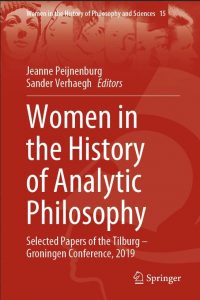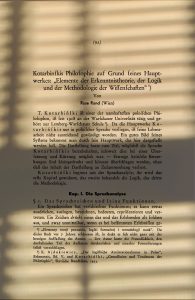Women in the History of Analytic Philosophy - Springer
 The book Women in the History of Analytic Philosophy (2022), edited by Jeanne Peijnenburg and Sander Verhaegh, is part of the Springer series Women in the History of Philosophy and Sciences and presents a collection of papers from the workshop held in October 2019 in Tilburg, Netherlands, dedicated to highlighting the contributions of female philosophers to the development of early analytic philosophy. In the following, we present the two contributions “E. E. Constance Jones on Identity and Predication” by Gary Ostertag and “What Can Rose Rand Teach Us About Modern Canon Formation?” by Katarina Mihaljević.
The book Women in the History of Analytic Philosophy (2022), edited by Jeanne Peijnenburg and Sander Verhaegh, is part of the Springer series Women in the History of Philosophy and Sciences and presents a collection of papers from the workshop held in October 2019 in Tilburg, Netherlands, dedicated to highlighting the contributions of female philosophers to the development of early analytic philosophy. In the following, we present the two contributions “E. E. Constance Jones on Identity and Predication” by Gary Ostertag and “What Can Rose Rand Teach Us About Modern Canon Formation?” by Katarina Mihaljević.
E. E. Constance Jones on Identity and Predication:
E. E. Constance Jones (1848–1922) is best known for her distinction between connotation and denotation, which predates Frege’s analogous distinction between Sinnand Bedeutung. Yet, this focus both misidentifies and limits her significance. While the distinction is important, I argue that the emphasis should be on its role in her law of significant assertion: “Any subject of predication is an identity of denotation in diversity of intension.” This law is her central contribution to philosophical logic, not the distinction itself. In the paper, I situate Jones’s distinction in the context of this law and reconstruct some of the central debates surrounding it. These all concern her endorsement of Hermann Lotze’s identity theory of predication. Although Jones seeks to improve on Lotze by showing how the identity theory need not take true identity statements to be trivial, there is some question as to whether identity plays an essential role in the resulting theory. I will argue that this worry is unfounded: whether or not it is objectionable on other grounds, Jones’s theory preserves the core of Lotze’s view. There is also a question, first voiced by W. E Johnson, whether Jones’s version of the theory—or indeed any version— generates a regress. This challenge, as I argue, is not so easily dismissed.
If you would like to learn more about jones, please have a look at our ECC entry “Intension / Extension in Emily Elizabeth Constance Jones (1848-1922)”.
What Can Rose Rand Teach Us About Modern Canon Formation?
This chapter proposes a novel way of understanding modern canon formation by looking at the processes that precede the publishing of philosophical work. These processes should be understood as a production line influenced by several external factors such as mentorship and peer review, working space and social networks. By using largely unexplored archival data available at the Archives of Scientific Philosophy at the University of Pittsburgh, this chapter presents the case of Rose Rand. She was a philosopher who had close ties with the Vienna Circle and who spent her professional years in exile in the United Kingdom and later in the United States. Her philosophical work, although deemed relevant by the experts in her field, has never entered the philosophical canon or found a place in any handbook of the history of analytic philosophy. By using available biographical data, this chapter shows the crucial role that external factors played in her attempt to produce peer-reviewed philosophical work.
You cannot copy content of this page








